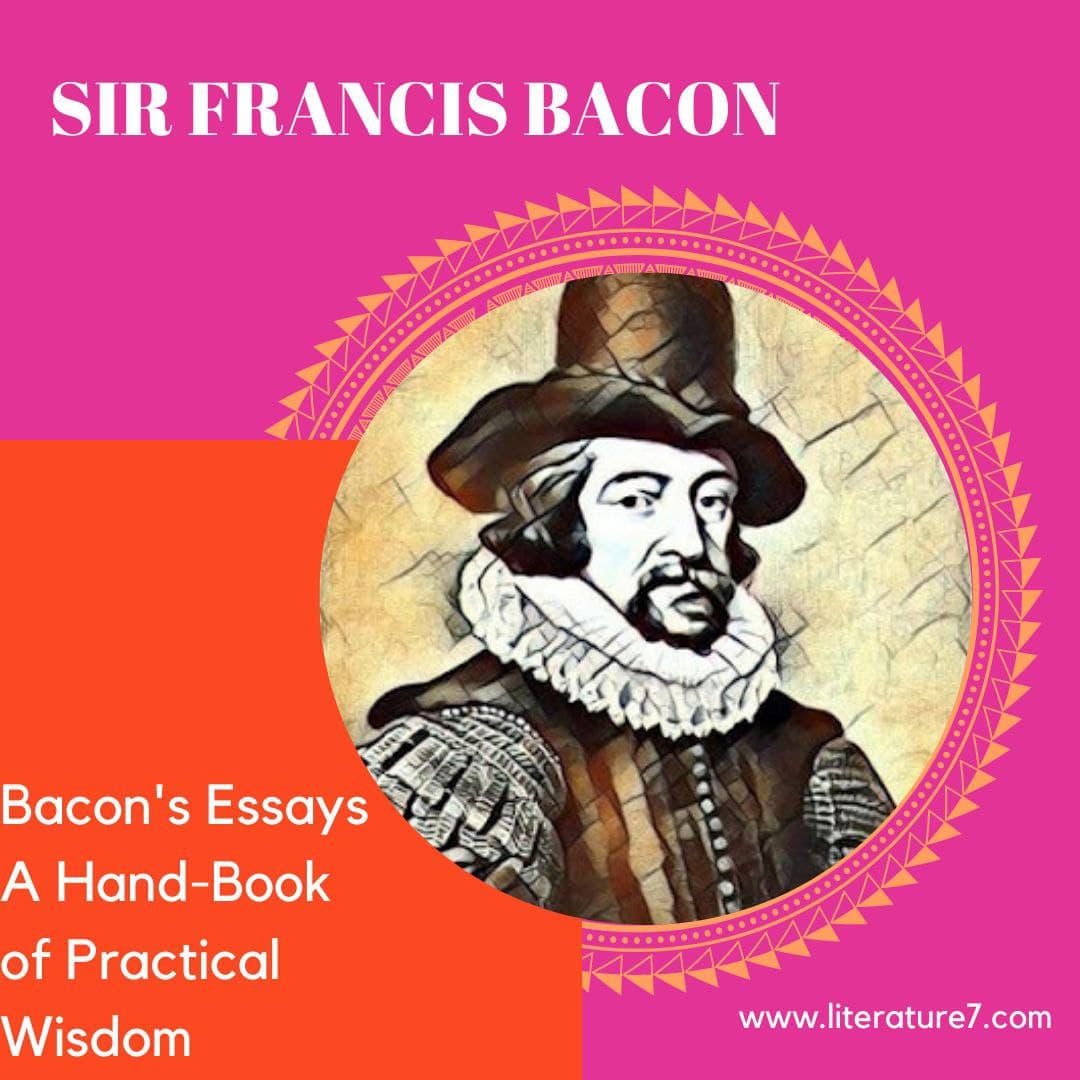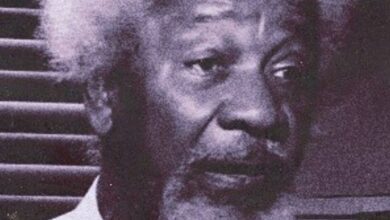Bacon’s Essays A Hand-Book of Practical Wisdom | Bacon’s Essays: A Blend of Philosophising, Moralising and Worldly Wisdom | Bacon’s Essays: More Concerned with Utility than Moral Principles

Practical Prejudices
“Above any other book of comparable scale in any literature,” Hudson says of Bacon’s essays. Nobody may doubt Bacon’s insight or his grasp of world affairs. He demonstrates extraordinary insight into the difficulties that men face in life. However, there is no doubt that his wisdom is prudential and realistic in nature.
Bacon was a Renaissance man, a man who sought to fully exploit the opportunities for mind and body that man possessed. The majority of literature is about man, and Bacon’s essays are about the man. The age needed a new breed of people capable of dealing effectively with the arts of peace and war. Bacon set out to present men with his “counsels-civil and moral,” which included sage principles of conduct. He preferred intervention to reflection. An intentional, pragmatic bias skews his perspective on information.
Bacon’s knowledge means that he does not have to be divorced from everyday life or indulged in for its own sake. It applies to everyday life and can be used to benefit man’s social and political affairs. As he states in his essay of studies, book knowledge must be augmented by experience, which must be enriched by book knowledge.
Thus, the wisdom shown by Bacon in his essays is constrained by this pragmatic consideration. It is, to put it bluntly, utilitarian. This is not to suggest that the essays are devoid of ethical or metaphysical considerations; rather, they have brushed aside or even explicitly mentioned at times but are generally subordinated to what is useful in everyday life: subordinated to achieving worldly success.
Skepticism
It is natural to conclude that Bacon’s insight was cynical, as some of his guidance casually disregards ethical standards and seems to suggest that nothing succeeds like achievement, that material progress is more necessary than anything else. Although, this is a misinterpretation and misunderstanding of his attitude. One must bear in mind that Bacon acknowledged the fundamental Christian tenet that man, though created in God’s image, was indeed a sinful creature—a fallen creature—and therefore more inclined to evil than to good. (And, while this is an unflattering view, there is no denying its truth—history and life experience bear this out.) Only a saint or a self-righteous hypocrite would deny it.)
Bacon is utilitarian, but he is so because he recognized that this mentality drives the vast majority of the world’s population, and success means only one thing to them: material success. Bacon writes for them—to guide them in their search for civil success. Thus, the essays demonstrate a pearl of worldly wisdom that entails astuteness, foresight, and moral judgment. How to survive in this country, how to advance to high positions, how to become wealthy—the list goes on—are all topics Bacon discusses in his essays.
Read also Plot Construction of Dr. Faustus
Thus, his essays are primarily utilitarian in nature and concern themselves with the art and technique that a man can employ in order to achieve success. His philosophy is pragmatic in nature; that is, it is a philosophy of surviving in the world. And this morality or moralizing is often driven by the recognition that man is fallible and can be required to adhere to ethical values only to a certain degree. This is not to suggest that Bacon lacked regard for lofty moral principles, at least in theory.
Philosopher-ethicist
At least two of his essays portray him as a person with a solid commitment to high moral sentiments and the sanctity of reality. His essay, Of Fact, extols the virtues of truth, compassion, and just and equitable dealings. Here he is a philosopher who argues for the discovery or quest for truth and extols the fulfillment that comes from “the vantage” point of truth. He addresses this audience as a moralist. He asserts that a man’s mind should be guided toward the “poles of reality.” Falsehood debases a guy, even though it assists him in achieving material success.
Bacon argues that man should pursue the path of honesty and truthfulness. It is worth noting here that Bacon’s observation of human behavior is also evident in this article. He states that men have an intrinsic love of deception because it enables them to maintain illusions and vanities and that men combine falsehood and truth to keep life interesting. This is not to say that Bacon is in favor of man indulging in deception. He simply juxtaposes the “noble ideal and the ignoble facts” in order to draw the reader’s attention to the fundamental truths of human behavior. It is crystal clear that Bacon aims to instill a love of reality in the reader’s mind with this essay.
See more Chaucer art of characterization in prologue to the canterbury tales
Similarly, his essay on Goodness and Nature’s Goodness is strictly moral in nature. He exhorts kindness, generosity, and benevolent action, declaring that no one should suffer as a result of being unnecessarily charitable, for charity knows no such thing as excess. There is an unequivocal dismissal of evil and malignity, as well as an ecstatic appreciation for Goodness.
Balanced Moral and Prudent Aspects
There are several essays in which Bacon advances a variety of moral precepts while not ignoring prudential considerations. Of Great Place is one such essay. Along with the astute observations made about people in high positions (such as how they lose their independence and are never truly satisfied in their hearts), there is a straightforward examination of the flaws that are often found in such people, as well as a strong recommendation to overcome these shortcomings.
Bacon, it is true, openly supports or rather acknowledges the use of dubious means by an aspirant to a high position. This is wise and utilitarian in nature. However, Bacon understands the importance of a great spot, which is the incentive it provides for good deeds. It is preferable for a man to use his power to actively benefit his fellow men. His essay strikes a balance between religion and the prudence required for worldly success.
Domestic and Social Relationships
When we read Bacon’s essays on topics such as love, friendship, parents and children, or marriage and single life, we are immediately struck by his very cold and unemotional treatment of subjects that could easily lend themselves to an emotional treatment. Additionally remarkable is Bacon’s purely utilitarian approach to these subjects. Prudence is the guiding principle of marriage, affection, and even friendship. In the theory of surviving in the world, wife and children are considered handicaps, affection is considered a hindrance, and friendship is calculated in terms of the benefits derived from it.
According to Bacon, love is an emotion unfit for existence. He merely allows for any consideration of nuptial love as a means of propagating humankind: Love is viewed as though it has no ennobling quality. Similarly, friendship is never discussed in terms of an intimate connection between two individuals but rather in terms of its usefulness. How a friend may serve a man is discussed, but no mention is made of the sacrifices that a man can make for a friend. A friend is invaluable in meeting a man’s needs in this country. Thus, it is beneficial to have a mate.
Similarly, marriage can be advantageous to some careers for men. A wife is advantageous to a man in many occupations. A wife is beneficial in a man’s life—as a lover throughout his youth, a companion in middle age, and a nurse in his old age. Apart from incurring the wrath of modern women’s libbers, such a comment seems to be entirely colored by an almost ignoble utilitarianism, reducing marriage to a prudent expenditure.
Also, topics as diverse as travel and research are subjected to the utilitarian norm. How each of us may aid a man in this world in his material development is what Bacon is concerned with. He loftily disregards a perfectly legitimate justification for indulging in pleasure. Travel serves a purpose—it educates the young and broadens the horizons of the elderly. According to Bacon, a wise man is one who applies his book experience to everyday life. Although one admires the common sense in such statements, one cannot overlook the logical perspective. Even when discussing gardens, Bacon is entirely focused on their usefulness.
Topics of Political and Civil Nature
Bacon is most at ease in these essays, which are brimming with the simple optimism that comes from close communication with statesmen, public officials, and the country’s rulers. In these essays, he establishes a solid advantage for his worldly experience, prudential judgment, and pure utilitarianism over any ideal morality.
He is openly Machiavellian in his proposals for policies and steps that are more heinous than just but necessary for maintaining the king’s protection and the country’s well-being, as well as for preserving the ruler’s honor and reputation in the eyes of his citizens. He urges rulers to keep faith alive in the populace in order to avert sedition. The key to good state policy is the rulers’ wisdom in balancing the high and the low, one party against another, or one strong leader against another.
Read more Critical appreciation of ode on intimations of immortality
However, one must bear in mind that, in terms of tangible outcomes in the field of politics, Bacon’s methods and means are very reasonable and permissible. They are the views of a realist and, as such, do not preach any perfect morality that would be out of place in politics, regardless of whether it is practiced in a dictatorship, despotic state, or democracy. In every mode of administration, honesty and sound dealings remain principles often spoken of. Still, a craft, Simulation, dissimulation, and cleverness in ascertaining and predicting a rival’s intentions and acts are universal laws followed in practice.
Critics correctly (and a little self-righteously) point out that Bacon quite calmly condones a compromise of moral values and often recommends appropriate ways to extract the maximum benefit from such a compromise. This is evident in Bacon’s essay Of Suitors, where he does not categorically condemn the concept of partially awarding a case to the undeserving but rather implies that the patron mediates between the two parties if he feels inclined to favor the undeserving.
Read also Critical analysis of songs of innocence and experience
Thus, also Simulation, which Bacon despises, is permissible if no other choice exists. Everything, every faculty of man, has an advantage and a disadvantage: success is determined by the individual’s ability to employ the faculty to achieve the greatest advantage and the least disadvantage. This is the guiding principle behind Bacon’s counsel.
Kind of Morality
Yet, one cannot tell whether Bacon’s advice is moral or immoral. When we read the essays, we are aware that their author’s morality is superior to that of the ordinary human being. Additionally, as he calls for the use of dubious tactics by rulers or elected officials, he does so with the public good in mind rather than personal ends in mind. In any case, he weighs the advantages and disadvantages; he is never concerned with the individual’s benefit; he is always concerned with the public good. Even within Bacon’s utilitarian code, there is a certain code of conduct—a morality that is maybe as strong as is possible in our modern world.
Conclusion
Bacon’s essays are undeniably utilitarian in their intent and attitude. And Bacon’s ideology is a pragmatic philosophy for the man in action. His essays are replete with moral precepts, but few of them are idealistic in nature (such as those in Of Truth and Of Goodness). His morality, for the most part, is tinged with an “A “worldly” accent, easily obtained and put to good use by a man bent on “getting along” in this universe.
These essays then encapsulate the wisdom and theory, the morality, of a clear-eyed observer who is well aware of what men should be but also of what they were. Furthermore, the counsels are not written by someone who considers what they should do. The only criterion he accepts in terms of “ought” “is whether an individual’s behavior benefits the state.





